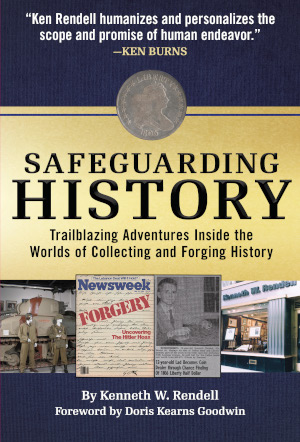On October 3, 2023, Whitman Publishing released Safeguarding History, the memoirs of internationally famous artifacts collector and dealer Kenneth W. Rendell. Subtitled Trailblazing Adventures Inside the Worlds of Collecting and Forging History, the 328-page book shares Rendell’s business philosophy as well as his life story, and shows why he’s known as the “Indiana Jones” of the collecting world.
Among coin collectors, Rendell is noted as a founding member of the Rittenhouse Society, a contemporary of Q. David Bowers and Kenneth Bressett. He was a prodigy coin dealer while in his teens in the 1950s, selling colonial coppers to such luminaries as Ambassador R. Henry Norweb, and a contributor to the Red Book at the age of sixteen.
Pulitzer Prize–winning historian Doris Kearns Goodwin wrote the foreword to Safeguarding History. Here, she shares her thoughts on Kenneth Rendell and his autobiography:
“This eloquent, captivating, and moving memoir takes the reader on the journey of an eleven-year-old boy, Kenneth Rendell, growing up in a poor neighborhood, who, with the sale of a single 1806 half dollar, experiences the magic of collecting and goes on to become the world’s most notable collector, dealer, and appraiser in historical letters, documents, and artifacts.
And what a journey it is! We share his excitement when, at the age of sixteen, he meets a dealer in presidential documents and trades his entire British coin collection for a group of presidential letters. While old coins were great historical artifacts, he fell in love with handwritten letters that provide a window into the hopes and dreams—the very soul—of figures who have shaped the destiny of our country. Collecting became an emotional pursuit as well as an intellectual one.
In an essay on the nature of collectors, the philosopher Walter Benjamin argues that collecting allows children a small corner where they can order a disordered world. For the teenage boy whose father fell into bankruptcy and committed suicide, collecting provided a sanctuary where he could be on his own, free from the pandemonium of his household.
He had found his vocation, the arena in which he felt he was most vitally alive, when, as the philosopher William James suggested, a voice inside speaks and says, ‘This is the real me!’ And how lucky we are to share in his passion, to savor the moments he comes upon breathtaking documents and letters—manuscript pages written by Henry David Thoreau, a George Washington letter discovered in a New Hampshire auction, a Thomas Jefferson letter about the future of slavery. (This letter, which Rendell bought in the early 1970s for $20,000—a princely sum when still in his twenties—and then immediately sold to Malcolm Forbes for $25,000, was eventually sold again in the 1990s after Forbes died for $700,000.)
Over the decades, as Rendell’s collecting interests expand from modern to ancient times, from North America to every continent in the world, we meet a cast of intriguing characters and are privy to an inside look at the complex world of collecting—a world filled with adventures, mysteries, sensational hoaxes, thefts, and even murders.
Self-taught in foreign languages, culture, and history, Rendell becomes an expert in authenticating handwritten materials and documents and is called upon as a special consultant in a number of high-profile cases that read like fast-moving detective stories.
A master storyteller, with keen insight into the motivations of people, Rendell brings the reader into the drama of uncovering the biggest hoaxes in modern literary times—the discovery of sixty volumes of a purported Hitler diary; the dramatic unearthing of a diary by Jack the Ripper, promising to reveal the mind of one of the most notorious serial killers; the sensational Mormon White Salamander letter and the related murders.
We follow Rendell’s painstaking work that revealed the forgeries—his examination of the individual characteristics of handwriting and the known habits of the writer. A uniformity in the writing and the ink used would suggest a diary written in a short period rather than over a number of years. He knew how to date the ink, the paper, the bindings, the use of words not yet in use in colloquial language. In Jack the Ripper’s supposed 1880s diary, the use of the phrase ‘one off,’ which was not in common use until 1925, was a clear warning signal.
Rendell’s role in debunking these multi-million-dollar hoaxes landed him in the front pages of newspapers and magazines. In print and on television, he was dubbed the Indiana Jones of the collecting world.
In each case, other independent experts had authenticated the material, and a great deal of time and money had been spent in publicity and publishing rights. Rendell concluded that publishers had seen only what they wanted to see—beating the competition, fame and fortune.
There are additional compelling stories behind Rendell’s creation of a 10,000-book library for Bill and Melinda Gates, and the building of the most comprehensive World War II collection that follows the war from beginning to end through tens of thousands of documents and artifacts, including Hitler’s writings, Nazi party banners, anti-Semitic broadsides, Resistance newspapers, Churchill’s propaganda posters and manuscripts, a first edition of Anne Frank’s diary, and the surrender documents.
In the end, however, this compelling memoir is the story of a boy who rises above adversity with ambition, a curiosity that allows him to keep learning his entire life, a powerful work ethic, an ability to think outside the box, and, most importantly, a recognition that reputation and character are the true driving forces of success.”
Doris Kearns Goodwin is a historian and presidential biographer, international keynote speaker, and New York Times #1 best-selling author. Her book No Ordinary Time: Franklin and Eleanor Roosevelt: The Home Front in World War II earned the Pulitzer Prize in history. She is the author of other bestsellers including Wait Till Next Year, The Fitzgeralds and the Kennedys (adapted into an award-winning television miniseries), and Lyndon Johnson and the American Dream

